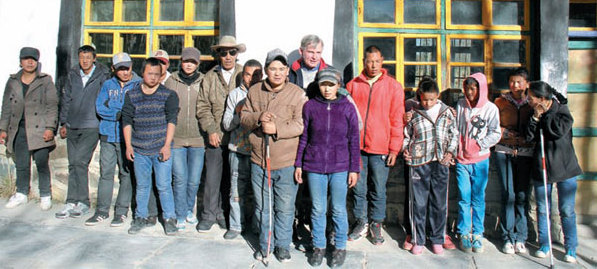
|
Ten years ago, Mike Parent arrived in the Tibet autonomous region to teach at the Braille Without Borders vocational school. Palden Nyima finds out why the Canadian intends to stay here until the end of his days. The sky stretched out clear and bright above our heads as we approached the remote village nestled among willows and fields high in the mountains. There was the laughter of children and the smell of butter tea as we arrived at the school we had arranged to visit, which was easy to spot, as "Braille Without Borders" was written conspicuously on a wall in three languages. The man we have come to interview, a Canadian who has lived here for almost 10 years, and who intends to be buried here, warmly welcomed us with the traditional Tibetan greeting, "tashidelek", and cups of tea. When Mike Parent first came to Baishung township in Xigaze prefecture in the Tibet autonomous region to teach at the Braille Without Borders vocational school, the children called him an old monkey because of his hairy arms. Now, after almost a decade of "being together 24 hours a day, seven days a week", the 70-year-old is called "chigyal pola" - which means "foreign grandpa". "At the beginning they called me here because they needed me. Now 10 years later they don't need me, they want me to stay because they love me," he says. It was a chance encounter that brought Parent to Baishung. He met Sabriye Tenberken, the German woman who co-founded Braille Without Borders, when he was studying the Tibetan language and culture at Tibet University from 1998 to 2000. He started by aiding the school financially, but when she asked him if he would be interested in teaching organic farming to visually impaired people in Tibet, Parent immediately agreed. In 2005, he started showing how to plant vegetables and crops on a very small piece of land. According to Parent, with 1-square-meter of land, visually impaired people need only to stretch out their hands to cultivate and harvest vegetables. The school has six greenhouses for planting crops, and 12 mini greenhouses that they use for teaching. And Parent also teaches the students how to produce organic fertilizer. "We feed 100 people three meals a day ourselves," says Parent proudly. According to official statistics, 30,000 of the 2.5 million inhabitants of the Tibet autonomous region are visually impaired. Compared to most areas in the world, this is well above the average ratio. "Before I came to the blind village, I had never seen the brighter world. I am happy here because I found equality here," says Tsering, 35, from Tibet's Shannan prefecture, who lost his sight four years ago. Parent says many adult visually impaired people such as Tsering really love the community and are reluctant to leave. "It is one of our difficulties. The donors don't want it to be a retirement home for blind people. But after they have learned how to make bread and it is time to leave, they find it hard to say goodbye." But he says the purpose of the vocational center is to improve the students' self-esteem and help them become contributing members of society. Teaching organic farming is just one of the things Parent does at the vocational school. He also teaches animal husbandry and every evening after supper, he teaches English. He is also a fitness coach to the children. Every morning, he gets up early and opens the gym and takes the visually impaired children through some exercises and teaches them to use the various sports equipment available. "Most of them are still young, they need to move frequently. I don't want to see them sitting in a corner all the time," he says. Such dedication is appreciated by the students and those who work with him. "Parent always thinks about others," says Ardon Ngawang Drolma, 38, the school principal. "He spends all his money on others and doesn't have any savings. Once, I found he only had 10 yuan ($1.63) in his pocket." "He told us simply one day that we should bury him on top of the hill after he died," she adds. "That is unforgettable." "They can live without me, but I think I cannot live without them. In my heart, they are part of my family," Parent says. When the interview ended, with his rough chapped hands, he shook hands with us, a big smile on his face. By Palden Nyima ( China Daily) |
日喀则边雄乡位于距拉萨250多公里的雅江左侧一座小山脚下,山脚下有个不起眼的藏族小村庄,很难想象这个偏僻的小村庄里竟然有所盲文无国界组织技能培训学校。 当本报记者到达这里时,孩子们纯真的歌声和醇香的酥油茶味从一个落满黄叶的大院中隐隐传来。一位精神矍铄的加拿大老人笑容可掬地说着“扎西德勒”这句藏族最吉祥的问候语,并献上哈达前来迎接。 这位老人就是迈克·詹姆斯·帕兰特。正是他指引一群失去光明的藏族孩子第一次开始认识自我、第一次开始拥有梦想、第一次触摸到有“色彩”的生活。 70岁的帕兰特先生说:“当初他们请我到这里来是因为他们需要我,转眼十年过去,他们已经不再需要我的帮助,但他们却不断地挽留我在这里,因为他们已经发自内心的爱上了我。” 帕兰特先生回忆起当时刚到盲校工作的情景,孩子们对这个金发碧眼的外国人充满好奇,不断抚摸他手上的体毛,以及他高高的鼻子,孩子们甚至以为他是一只来自遥远国度的猴子,一直不敢亲近。如今,孩子们已经深深的爱上了这位可爱的外国老头了。 在盲文无国界组织技能培训中心,帕兰特扮演着很多重要的角色。在农田里他是位有机农耕推广者;在学校里他不仅仅扮演着英语教师的角色,甚至身兼司机、健身教练等数职;在养牛场,他是一位畜牧培训师,随着时间的推移,他最终被孩子们接纳,孩子们更是亲切地称他为“齐杰波拉”(藏语意为“老外爷爷”)。 这里海拔接近4000米,在这样一个高寒缺氧,自然条件艰苦的环境下,究竟是什么原因让这位加拿大老人如此不辞辛劳的无偿工作,而且一待就是10年之久? 许多陌生人常常会好奇地问他究竟为什么会甘愿在一个偏远的高海拔山区默默奉献,对于帕兰特而言,这既是命运的安排,又的确是一个他从未认真思考过的问题。 1998年至2004年,当时在西藏大学攻读藏学专业的他结识了盲文无国界组织创始人萨布瑞亚,当萨布瑞亚得知帕兰特是一位农业专家后,便邀请他到边雄盲校推广有机农耕技术。出于对萨布瑞亚的敬佩和对盲人的同情,他欣然应邀。 自2003年开始,帕兰特开始以募捐资金等方式资助边雄盲校。2005年他更是亲来到这所盲校,为盲人们传授如何在小面积的土地上播种蔬菜、花草、及药用植物,并辅导他们如何制作天然肥料。 帕兰介绍说,“这些耕地面积只有一平方米,盲人和视力残疾人可以站在花园外进行播种、收割、并通过触摸了解植物的长势。” 据帕兰特介绍,该盲校拥有6个用来播种庄稼的温室大棚,以及12个用于教学的有机蔬菜培植以及制作天然肥料的微型温室大棚。 “我们用自己的双手为100多人供应一日三餐所用的蔬菜,”帕兰特骄傲地说。 为了不让化学肥料对盲童的身体造成再次伤害,因此帕兰特一直以来都坚持使用有机化肥。 “这些培训的主要目的,是为了帮助这些孩子找到自身存在的价值,并获得家庭和社会的认可,”帕兰特语重心长的说。 除了有机农耕培训和天然化肥制作外,盲校的技能培训还包括卡垫编织、奶酪制作、面包烘焙、残疾人按摩等八个专业,孩子们进入盲校后,有6到8个月的时间学习并掌握这些专业技能。 来自西藏山南地区的次仁骄傲地告诉记者,“没来盲人培训中心之前,我从未想过我的生活会变得如此有意义,在这里我过得充实而幸福、在这里我同样学会了通过劳动自力更生,”四年前的一场变故让他突然失去了视力。 帕兰特说,像次仁这样的盲人,一旦到了培训中心,就不愿回去了,因为他们在这里学会了通过自己的劳动证明自己的价值,并赢得他人的尊重。 “募捐者和培训中心的老师们不想让这个盲人培训中心变成盲人退休基地,但当我们的盲人学员们刚刚学会怎样制作一张烙饼或其它技能后,当他们离开培训中心时,他们发现向培训中心的朋友们说一声‘再见’是如此之难”,帕兰特说。 每天清晨,帕兰特都会早早起床,并打开健身房的门,带领盲人学员们来到健身房锻炼身体,并指导他们如何正确的使用这些健身器材。 “他们如此年轻,需要通过运动强健体魄,我不想看到他们整天静静地呆在一个角落里一动不动,”帕兰特说。 38岁的阿珍是这所培训中心的校长,她也是帕兰特的最佳搭档之一。据阿珍介绍,帕兰特总是在为别人着想。“帕兰特把所有的钱都用在别人身上,而他自己却没有任何存款。有一次,我惊奇的发现他的口袋里只有10元人民币。” “帕兰特曾经告诉我们,如果有一天当他离开这个世界时,就把他的尸体埋在后面那座山上,他的愿望竟是如此简单。”对于阿珍来说,这是一件难忘的回忆。 “现在他们没有我也可以生活,但此刻我在想,如果没有他们,我将面对怎样的生活,因为他们早已与我亲如一家人,”帕兰特说。 功夫不负有心人。据阿珍校长介绍,如今,在帕兰特和同事们的努力下,盲校的很多孩子都考入了普通学校。“在日喀则地区,我们有30个盲人学生,他们分布在各个学校,其中的4个孩子顺利地考上了大学,他们的成绩甚至超过了一些视力正常的学生。” 帕兰特于2013年获得中国政府颁发的“友谊奖”,这一奖项颁发给了来自20个国家的50位专家。当提到如何看待他获得的“国际友谊奖”这个荣誉时,他谦虚地说这个奖项不仅仅是颁发给他个人的。“我非常愿意接受这个荣誉,因为对我来说,这简直就像自己的子女们向长辈表达谢意,从中我可以感觉到他们喜欢我,他们想让我继续待下去。” 当结束采访离开时,日喀则的天空阳光明媚,院子里传来孩子们天真无邪的嬉笑声和嘹亮自信的歌声,帕兰特微笑着用他那满是伤痕的手与记者们握手道别…… (中国日报西藏记者站 华旦尼玛 2013年12月10日) |